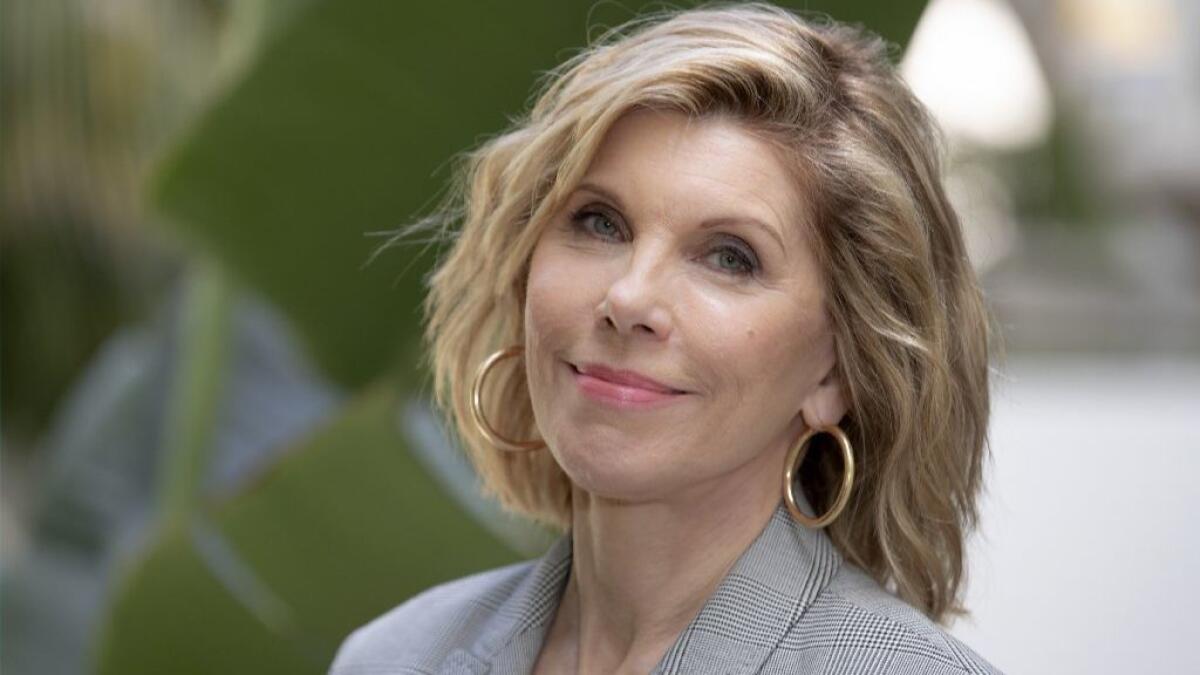Q&A: Christine Baranski and ‘The Good Fight’ tackle ‘the world becoming unhinged’

When she was first cast as hard-charging attorney Diane Lockhart, Christine Baranski thought to herself, “How do I convey that I’m the head of a law firm? I don’t have a law degree. This woman is smarter than me.” Ten years after that start as a supporting player on CBS’ legal drama “The Good Wife,” Diane took center stage when the series morphed into “The Good Fight” on CBS All Access, and now Baranski has her down pat: icily composed, perfectly coiffed and five steps ahead of her opponents.
In Season 2, her anger was simmering. Season 3 finds liberal feminist Diane at full boil, on a mission. When she isn’t in her pristine office at Reddick, Boseman & Lockhart, she’s plotting to take down the Trump administration. Recently, Baranski could be found at the Peninsula Hotel, talking about figuring out Diane, her MSNBC addiction and the importance of being on a series that’s almost giddily gloves-off when it comes to addressing all things Trump.
“When and if our world ever returns to some semblance of normalcy, I think you’ll look back and say, ‘This was a show that was of its time, that dealt with what’s going on,’” she says. “That said, I really do need a vacation.”
(About a week after this interview, due to a dispute with CBS All Access about subject matter, one of the animated musical shorts that accompany each episode of “The Good Fight” was replaced with the words “CBS has censored this content.” Baranski could not be reached for comment.)
Impregnated porn stars, the “pee tape,” Diane’s strategies for impeachment. Do you ever open up a script and think, “How are we going to get away with this?”
We’re living in crazy times. We have writers who are brave, highly intelligent, and asking moral and philosophical questions. These fictional characters are lawyers living in the world of the rule of law who feel that perhaps the rails are coming off. That’s what [showrunners Michelle and Robert King] want to write about: the world becoming unhinged.
You’ve said that cable news has become a form of research for you.
I don’t [watch] it only as research. I’m concerned about what’s going on. I never watched morning television [before]. For me, it was public radio playing Bach or Mozart. I wanted to start my day calm. Since I started doing “The Good Fight,” I do a bit of Bach with my coffee and it’s on to [“Morning Joe”]. I have a television set in my dressing room. Then when I go home it’s Chris Hayes, Rachel [Maddow] and Lawrence [O’Donnell]. They’ve become company. I live alone and at the end of the day it’s like spending time with like-minded people. [Some] say MSNBC is as much propaganda as Fox News. Well, I think not. I’m deeply impressed with what journalists are doing at this moment. If we survive this, it’ll be because of the relentless investigation and fact-checking done by the press. I feel at times, like so many people, I wish I could turn it off. But as awful as it is, we have to stay awake.
Let’s talk about Diane’s wardrobe. What does she hope her statement necklaces and tailored suits say about her?
I’ve always thought of Diane’s wardrobe as her armor. Any woman who arrives in a gorgeous suit with an enormous peacock brooch, the high heels, the whole thing? It just says “Don’t eff with me.” [laughs]
Did you learn this by studying alpha female attorneys?
I’ve learned as much by watching men who are powerful as watching women. One of the things I love most about Diane is that she’s often the only woman in the room. There she is, having to put the [men] in line. Observe powerful people: They don’t need to do a lot. They have power. Just the way you talk. You don’t have to raise your voice. When you’re the king, everybody else has to move around and talk loudly. If you really want to make your point, speak in declarative sentences. Don’t ask for permission. That’s the way it is.
This season Diane takes up martial arts as well as competitive ax-throwing. What’s going on here?
It’s Diane as warrior. The Kings said, “We want Diane to find something to channel her rage and sense of helplessness.” I love that aikido wasn’t aggressive enough for her. [laughs] I went to an actual ax-throwing studio with cages. They serve wine there. [laughs] I don’t see myself going off to an ax-throwing place in Brooklyn, but I really got into it. But to answer your question, it’s a physical manifestation of her inner state, the aikido and the ax throwing. What’s next? Pole dancing? [laughs]
More to Read
From the Oscars to the Emmys.
Get the Envelope newsletter for exclusive awards season coverage, behind-the-scenes stories from the Envelope podcast and columnist Glenn Whipp’s must-read analysis.
You may occasionally receive promotional content from the Los Angeles Times.










